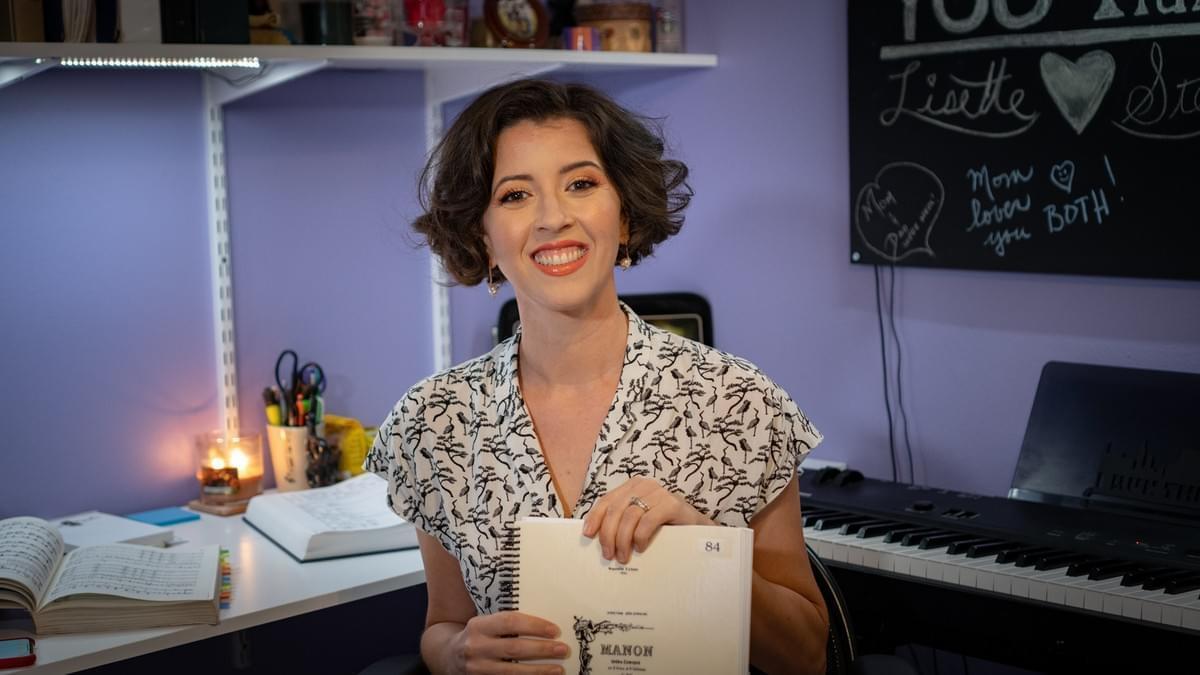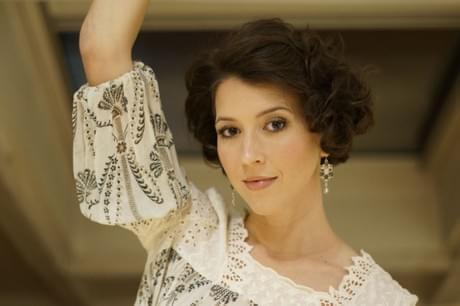Hey everyone! It’s time to start this season fresh, and you guys have been busy sending me all your amazing questions. I try to answer each one as you guys know, but this is a question I get frequently, and there is a lot that goes into answering it. So I thought it would be a fun video to make. Throughout my career I have sung numerous roles, both short and long, in all different types of repertoire, in several languages. Over time I’ve developed some really great methods for learning music on my own while on the road, how to prepare it efficiently, and have it memorized and ready to go for the first day of rehearsal. This season I’ll be singing Massenet’s MANON for the first time, a long and taxing role with significant musical and textual challenges. I was able to put all my methods into practice for this role, so I will be using MANON as my example.
This video is focused on musical preparation and memorizing. Of course there is a lot more that goes into role preparation, such as historical research, dramatic and character work, reading the book or play the opera is based on, etc. That’s a subject for another video. So I hope you can gain some tools for your musical prep and share ideas in the comments below!
Timestamps and summary, as always:
ARC OF THE CHARACTER: 2:05
The first step I take is assessing the character’s overall presence in the opera, and their significance; where are they from and where are they going? I try to get a general idea of the scope of the role and try to figure out where the biggest challenges are.
READ THE TEXT: 2:37
Next I read the entire piece all the way through, as if it were a play, and get the full story in my head. I use a dictionary if necessary to help with translations. My French is pretty strong, and that makes my life easier. If your language skills are strong, it will help you be able to breeze through this step.
LANGUAGES: 3:10
Proficiency in the operatic languages is the single most beneficial thing you can do for yourself to help you memorize and interpret any role you sing. The more of your young life you devote to it, the more it will pay off. Your career will likely take you to foreign countries, you will likely encounter international casts, and you may feel behind if you’re not able to work in a language fluently. Take the time and make languages a priority.
MY BOOKMARKS: 4:49
I organize my score with tabs to find my character’s entrances easily.
RECORDINGS: 5:19
Decide whether you can or should use them to help you learn your role. I find them helpful to hear orchestration, ensembles, and if there is a singer I admire, to know what they did as an example. Recordings do help you also learn operatic traditions that aren’t necessarily notated in the score but are expected. Though they are helpful, try not to use recordings as a crutch. There are often mistakes, cuts, inconsistencies, and you might start to imitate a sound or technique that isn’t appropriate for you. Go to your teacher if you need technical help. The score is the most important resource. So I put my recordings away after a couple of listens.
HARD PARTS FIRST: 8:09
I always tackle recits, ensembles, and finales first, and save the arias for last. Recits take the most drilling, and ensembles must be rehearsed carefully since you’ll be learning them alone.
COUNT: 9:16
This is one of the main reasons I don’t rely on recordings. The score may have a time signature that sounds nothing like what the music seems like it should be. This is often the case with French music, and in this score, for example, the time signatures and keys change a lot. I rely on my photographic memory, but I also count my way through tricky bits so that I never miss a beat.
ARIAS: 10:33
|Though it may be the hardest to sing, I find the arias the easiest to learn, because the music tends to be more melodic than say, the recits. So I leave them for last, unless I am singing a Handel or other role that has several of them, in which I need to incorporate ornamentation in the da capo. Then I tackle the arias first.
RECORD YOURSELF: 11:13
If there is a bit of music that I find extra tricky, I record myself on my phone singing/counting it, in key, so that I can have it for easy repeat listening later. Isolating a section of music like this helps me fill in the gaps.
CONDUCT: 13:23
With music that changes time signatures a lot, this is extra helpful. Remember that you’ll have to count and watch a conductor on stage. I find that putting music into my body with a gesture, like conducting, can help me memorize it faster and make fewer mistakes.
WORK BACKWARDS: 14:08
I often break up my music and learn it in backwards order, particularly if there is a long section. I memorize faster by always learning the next phrase!
WRITE THE TEXT: 15:19
This is a tedious step but one that I would never ever skip. As I’m getting to the point where I’ve been with the role for a few weeks and am starting to memorize, I close my score and write down my text, scene by scene, in its original language. For this, having a literal translation in my head is vital. Writing the text helps organize and engage my memory flow, and it helps strengthen my languages.
SPEAK THE TEXT: 19:11
An efficient way to get the language feeling natural is to speak the text, in rhythm or not in rhythm, both are helpful. There have been situations where I’ve been asked by a director to recite text as though I were in a play. Practicing this beforehand gives me an advantage.
CONCENTRATED PRACTICE VS. DISTRACTED PRACTICE: 20:02
Concentrated means I do nothing but practice, without distractions, for a period of time: study, learn notes, sing, and repeat. This is a fully focused way to spend time working. Distracted practice means I’m practicing in my head but doing something else, such as running, doing chores, watching TV, etc. I do a lot more distracted practice than concentrated, but I need both. Distracted practice is how I test myself and find holes in my memory, and then I know what I should work on in my concentrated sessions. This makes my use of time more efficient.
WHEN TO PRACTICE: 23:34
I’m freshest in the morning, so that’s when I do most of my studying. I also find that if I glance through something just before bed I wake up with it strongly ingrained in my memory the next day.
GETTING IT INTO MY VOICE: 25:20
I don’t sing too much of the role too early on. I like to get a real mental grasp of the role musically before I start working it in my voice. I do this partially because I am often singing something else while learning something new, so it saves me from over-using my voice, and partially because once we get to the rehearsals, things are likely to change. I sing through a role after I’ve done all of the major bookwork, and I work it into my voice as the last major step in my preparation.
EVERYTHING CHANGES: 27:38
|I can’t stress enough how much things will evolve from the time you start singing a role on your own or with your teacher, to the time you put it on its feet in rehearsal with your colleagues and conductor. I find that if I have built up too many habits before I get there, it’s pretty hard to undo them once we get into rehearsals. Also the set, the costumes, the acoustics, the staging…all of these things will affect your performance. So I try to be ready for anything. Prepared, but neutral!


,format(webp)/https%3A%2F%2Flisetteoropesa.com%2Fmedia%2Fnews%2Flisette-oropesa-manon-metropolitan-opera-2019.jpg)
,format(webp)/https%3A%2F%2Flisetteoropesa.com%2Fmedia%2Fnews%2Flisette-oropesa-athens-voice.jpg)
,s,m,a,r,t,,,f,o,r,m,a,t,(,w,e,b,p,),,,s,h,a,r,p,e,n,(,0,.,5,,,0,.,5,,,t,r,u,e,)/https%3A%2F%2Flisetteoropesa.com%2Fmedia%2Fgallery%2F2024%2Fportraits%2F202408-01-portrait-lisette-oropesa.jpg)







